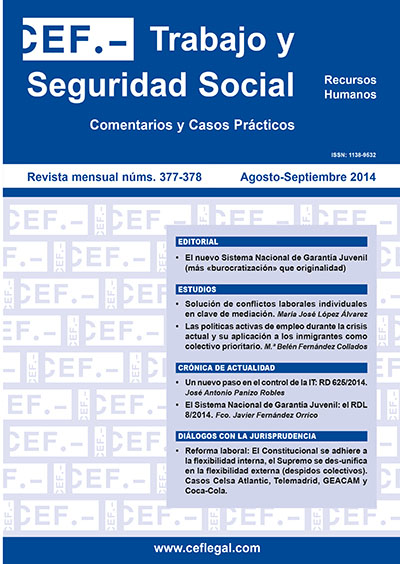A new step in the control of temporary disability benefits from Social Security: Royal Decree 625/2014
DOI:
https://doi.org/10.51302/rtss.2014.2996Keywords:
Social Security, temporary disability, managing entity, Public Health Services, joins, controlAbstract
Within the economic benefits that make up the framework of the protective action of the Social Security certainly is the amount of the temporary disability which has suffered a major transformation with respect to its management and control, given that management is complex, since it affects a multiplicity of authorities and agencies involved, so that from the mid-eighties of the last century, and periodically, the regulation of the management of temporary disability has been subjected to continuous modifications have been aimed to contain spending that it represents, as well as tackling the abuse, if not fraudulent, access to protection.
Now if these objectives could answer a specific reality of increased spending in the last quarter of the last century and in the early years of this, however since the advent of the economic crisis and its consequences maintaining , is witnessing a slowdown in spending on temporary disabi-
lity, measured both in absolute terms and in spending «relative», so that the objectives pursued in recent reforms have set in giving a greater role to entities responsible for economic benefit, rather than monitoring by the health authorities, while improving the management of the provision, given the possibilities offered by the use of information technologies and communication.
In this context we must place the adoption and entry into force of Royal Decree 625/2014 of 18 July, that certain aspects of the management and control processes for temporary disability are regulated in the first three hundred sixty-five days its duration, which replaces the previous regulations governing the management and control of this provision, and complements other rules, adapting the content of those legislative changes that have taken place in the field of management and control of the provision referred to, since 1997.


















